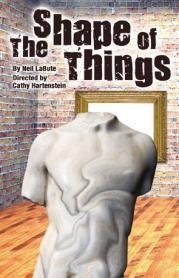The first mistake in Arizona Repertory Theatre’s production of Neil LaBute’s “”The Shape of Things”” was vastly over-hyping the play’s so-called controversial nature. All the advance press, the play’s description in the 2010-2011 season lineup and the dramaturge’s notes in the program assured the audience it was about to witness something Provocative, with a capital “”P.”” Christopher L. Pankratz, the play’s dramaturge, described “”The Shape of Things”” as a “”postmodern existentialist exploration of the subjectivity of love and art.”” With that many overwrought academic-speak labels, it had to be good, right?
Overwrought, as it turned out, proved a much more accurate term for the play. Sure, there are references quite early on to male anatomy, a smattering of curse words, including the dreaded c-u-next-Tuesday in the play’s final scene, and some sexual content. But the storyline itself, which promised so much angsty, thought-provoking, paradigm-challenging bang for your buck, felt gimmicky and tame.
“”The Shape of Things”” offers a modernized and mean-spirited take on the ugly-duckling-turned-swan story, framed, as we’re relentlessly reminded, by questions of artifice and truth. Adam, played to sweet, nerdy and doomed perfection by Javan Nelson, is the swan; Evelyn (the prefix of which is Eve — see how he did that?), played by Dylan Page, sets out first to woo and then to redo him. As the relationship progresses, Evelyn exerts more and more disturbing levels of power over Adam’s inner and outer self; at one point, in a rare and searing display of believable emotion, Adam tells Evelyn, “”You’re dangerously close to owning me.”” Oh, if only he knew.
None of the actors is to blame for the play’s failure to deliver on its vastly overstated promises. Nelson’s Adam is spot-on. Rarely can a young actor deliver lines of dialogue as if he had thought of them in the moment, but each of Adam’s halting, self-doubting and funny lines emerges as if straight from his loveable brain. It’s easy to see why Evelyn chooses him. What’s not clear is why, for the love of God why, he lets himself be chosen by her.
Page, as Evelyn, struts across the stage in scary high-heeled boots, cursing and bullying and flinging around outrageous pronouncements about love and the meaning of art. She seems to be the playwright’s mouthpiece, and offers the audience a glimpse into how unpleasant LaBute must be to hang out with. Page’s performance is at times irritating, but that doesn’t seem to be her fault. At a few choice moments, Page’s acting manages to outshine the one-dimensional bitchiness of her character, and the audience briefly understands what Adam sees in this monster.
The cast is rounded out by Heather Grace Hancock and Mike Reasor, who play Jenny and Phil, a newly engaged couple and Adam’s old friends. Phil, especially, challenges Adam as he watches Evelyn turn him into a completely different person, and Reasor’s hilarious attacks on Evelyn are a breath of fresh air. Jenny completes LaBute’s store of stock female characters, the wounded ingénue to Evelyn’s uber-bitch. It’s a shame that neither actress gets to play a character with much depth; Hancock, too, has moments of transcendence, but is mostly stuck in her hackneyed shy-girl role. However, her final speech to Adam and Evelyn, though deliberately not eloquent, does make one want to stand up and cheer.
The play hurtles toward a conclusion that, if you’ve been paying attention, you’re likely to predict in the opening minutes. Still, the actors manage to give the bruising ending real emotional clout, and, as promised, provide some food for thought. But no one wants to have the message of a work of art shoved down his or her throat; Evelyn, and LaBute himself, would do well to learn this.









